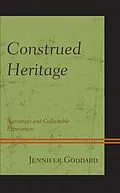Heritage theory places individual experiences in a precarious position. Representational approaches draw attention to socio-political contexts and ethical considerations but largely render the self silent. Affective approaches, on the other hand, develop meaningful components of the emotive and sensed self, but internalized and unmitigated heritage runs the risk of perpetuating oppressive constructs. In Construed Heritage, Jennifer Goddard views heritage experiences as subjective-objective relationships that may be analyzed through discursive and figurative construal level distances. Goddard further contends that memory consumes and retains those heritage experiences as cognitive objects where they are collected and curated into personal narratives.
Autorentext
Jennifer Goddard is research scholar at the Ronin Institute for Independent Scholarship.
Inhalt
Introduction
Section I: Subjective Narratives and Objectified Experience
Chapter 1: Palomar's Gaze: Subjective Positioning
Chapter 2: Narrative Theory: Between Representation and Affect
Section II: Construal Distance
Chapter 3: Relationships of Distance: Construal
Chapter 4: Construal and Subjective Gazing
Chapter 5: Construed Narrative Positions: Interpretation and Visitation
Section III: Collectable Experiences
Chapter 6: Collecting Overview
Chapter 7: Collecting Attributes and Experience Parallels
Section IV: Cognitive Museums
Chapter 8: Motivation and Narrative Goals
Chapter 9: Autobiographical Reasoning
Section V: Forces of Abstraction and Distance
Chapter 10: Loss Aversion: Valence and Possession
Chapter 11: Self-Narrative Themes and Plotlines
Section VI: Anticipating Narratives: Applicable Heritage
Chapter 12: Interpretive Considerations
Conclusion: Construed Heritage Experiences
